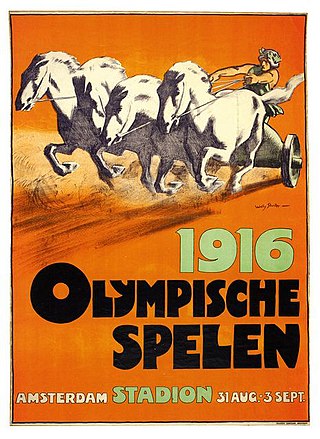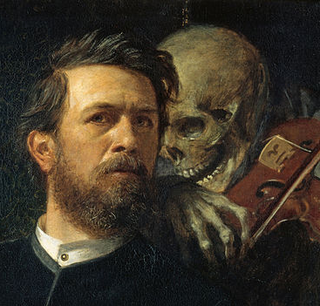
The "Deutschlandlied", officially titled "Das Lied der Deutschen", has been the national anthem of Germany either wholly or in part since 1922, except for a seven-year gap following World War II in West Germany. In East Germany, the national anthem was "Auferstanden aus Ruinen" between 1949 and 1990.

The 1936 Summer Olympics, officially known as the Games of the XI Olympiad and commonly known as Berlin 1936, was an international multi-sport event held from 1 to 16 August 1936 in Berlin, Germany. Berlin won the bid to host the Games over Barcelona at the 29th IOC Session on 26 April 1931. The 1936 Games marked the second and most recent time the International Olympic Committee gathered to vote in a city that was bidding to host those Games. Later rule modifications forbade cities hosting the bid vote from being awarded the games.

Richard Georg Strauss was a German composer and conductor best known for his tone poems and operas. Considered a leading composer of the late Romantic and early modern eras, he has been described as a successor of Richard Wagner and Franz Liszt. Along with Gustav Mahler, he represents the late flowering of German Romanticism, in which pioneering subtleties of orchestration are combined with an advanced harmonic style.

The 1916 Summer Olympics, officially known as the Games of the VI Olympiad, were scheduled to be held in Berlin, German Empire, but were eventually cancelled for the first time in their 20-year history due to the outbreak of World War I. Berlin was selected as the host city during the 14th IOC Session in Stockholm on 4 July 1912, defeating bids from Alexandria, Amsterdam, Brussels, Budapest and Cleveland. After the 1916 Games were cancelled, Berlin would eventually host the 1936 Summer Olympics, twenty years later.

"L-Innu Malti" is the national anthem of Malta. It is written in the form of a prayer to God. Officially adopted in 1964 upon independence from the United Kingdom, it was composed by Robert Samut, and the lyrics were written by Dun Karm Psaila.

The 1936 Winter Olympics, officially known as the IV Olympic Winter Games and commonly known as Garmisch-Partenkirchen 1936, were a winter multi-sport event held from 6 to 16 February 1936 in the market town of Garmisch-Partenkirchen, Germany. The country also hosted the 1936 Summer Olympics, which were held in Berlin. It was the last year in which the Summer and Winter Games both took place in the same country.

"Gott erhalte Franz den Kaiser" was a personal anthem to Francis II, Emperor of the Holy Roman Empire and later of the Austrian Empire, with lyrics by Lorenz Leopold Haschka (1749–1827) and music by Joseph Haydn. It is sometimes called the "Kaiserhymne". Haydn's tune has since been widely employed in other contexts: in works of classical music, in Christian hymns, in alma maters, and as the tune of the "Deutschlandlied", the national anthem of Germany.

Carl Diem was a German sports administrator, and as Secretary General of the Organizing Committee of the Berlin Olympic Games, the chief organizer of the 1936 Olympic Summer Games.

The International Olympic Committee (IOC) uses icons, flags, and symbols to elevate the Olympic Games. These symbols include those commonly used during Olympic competition—such as the flame, fanfare and theme—as well as those used throughout the years, such as the Olympic flag.

The Olympic Hymn, also known as the Olympic Anthem, is a choral cantata by opera composer Spyridon Samaras (1861–1917), with Demotic Greek lyrics by Greek poet Kostis Palamas. Both poet and composer were the choice of the Greek Demetrius Vikelas, who was the first President of the International Olympic Committee.

Japanese Festival Music, Op. 84 (1940), is a composition by Richard Strauss. The full title is Festmusik zur Feier des 2600jährigen Bestehens des Kaiserreichs Japan für großes Orchester .
The Closing Ceremony of the 1996 Summer Olympics took place on August 4, 1996, at the Centennial Olympic Stadium in Atlanta, United States at approximately 8:00 PM EDT (UTC−4). It was produced by Don Mischer.

"Ode to Joy" is an ode written in the summer of 1785 by German poet, playwright, and historian Friedrich Schiller and published the following year in Thalia. A slightly revised version appeared in 1808, changing two lines of the first and omitting the last stanza.

The National Socialist League of the Reich for Physical Exercise was the umbrella organization for sports and physical education in Nazi Germany. The NSRL was known as the German League of the Reich for Physical Exercise until 1938. The organization was expanded to Austria after that country's annexation by Nazi Germany.
Christian Keymann was a German hymnwriter. He is known for writing the chorale "Meinen Jesum laß ich nicht" in 1658, which served as the base for Bach's chorale cantata Meinen Jesum laß ich nicht, BWV 124, and other compositions.
The Hymne an Deutschland is a patriotic song which the then-president of West Germany, Theodor Heuss, aspired to establish as the new national anthem of Germany. During the early 1950s prior to the adoption of "Deutschlandlied" by West Germany, it acted as a sort of de facto national anthem of the nascent state.

"Traum durch die Dämmerung", is both a German poem by Otto Julius Bierbaum and a Lied by Richard Strauss, his Op. 29/1. The opening line is "Weite Wiesen im Dämmergrau". It is the first of three songs by Strauss based on love poems by Bierbaum, composed and published in Munich in 1895, and dedicated to Eugen Gura. The works were scored for medium voice and piano, and published by Universal Edition as 3 Lieder mit Klavierbegleitung, later with English versions and orchestral arrangements.

"Notturno", Opus 44, Number 1, is an orchestral song written for low voice, which Richard Strauss composed in 1899 based on a poem Erscheinung by the German poet Richard Dehmel (1863-1920). In performance it takes about 13 minutes. Norman Del Mar described it as “ranking amongst Strauss’s finest as well as more ambitious works”.

Theodor Lewald was a civil servant in the German Reich and an executive of the International Olympic Committee. He was the President of the Olympic organising committee for the 1936 Summer Olympics in Berlin.
The closing ceremony of the 1984 Summer Olympics took place at the Los Angeles Memorial Coliseum in Los Angeles, California on Sunday, August 12, 1984, at 20:00 PDT.

















